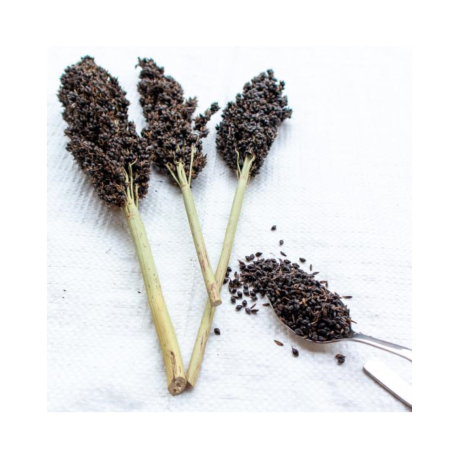



Reference: S1005-1
Black sorghum - Sorghum Noir in cluster
Black Sorghum - Black Cluster Sorghum
Peeled peanuts are very popular treats for parrots.
They are to be distributed sparingly because they are rich.
Ideal food to fill your wild bird dispensers, they will bring the necessary fat to the birds to spend the winter more easily.
The favorite of chickadees and a real treat for many birds.
Properties of Pine or Larix seeds.
Anti-inflammatory, analgesic, antispasmodic,
Antiseptic, anti-infectious (pneumococci),
Decongestant of the small pelvis and prostate,
Diuretic
Expectorant, tonic for the respiratory organs.
Carrot seeds are very rich in vitamins with a high proportion of vitamin A and carotene, as well as vitamin B, calcium and valuable carbohydrates.
Peeled peanuts are very popular treats for parrots.
They are to be distributed sparingly because they are rich.
Ideal food to fill your wild bird dispensers, they will bring the necessary fat to the birds to spend the winter more easily.
The favorite of chickadees and a real treat for many birds.
Chia is sage. It is an annual plant up to 1 m tall whose scientific name is Salvia hispanica.
The composition of chia seed closely resembles that of other mucilaginous seeds such as flaxseeds and psyllium. Unlike flaxseed, however, chia does not have anti-nutritional factors, factors that limit the use of flaxseed without prior hot treatment. Anti-nutritional factors are cyanogenic glycosides or linatins, inhibitors of vitamin B6 that prevent its action. Chia also has a much more pleasant taste than flaxseed and birds consume it more willingly.
Foniopaddy Seed is a natural grass seed grown on our plantations in Uganda. Scientific research has shown that Foniopaddy has a beneficial effect on coccidiosis.
Flaxseed is rich in omega 3, which is essential for the cardiovascular system.
Cedar nuts contain approximately 55% of valuable unsaturated fatty acids, particularly linoleic and alpha-linolenic acid, as well as the rare pinoleic/pinolenic acid. They are rich in tocopherols (vitamin E) as antioxidants and high-quality proteins (approx. 17%). They also contain numerous minerals (including magnesium, potassium, phosphorus), trace elements (copper, manganese, zinc), vitamins (K and B), and flavonoids.
Radish seeds have antioxidant, detoxifying, draining, and decongestant properties.
Turnip is almost similar to rapeseed, the difference is the more bitter flavor of the latter. Turnip seed is rich in protein and favourable to the improvement of song, so it is interesting during the breeding season in canaries.
A type of seed with a mild taste and high protein content. They are also high in fat.
This seed is quite fatty, we advise you not to exceed 10% of your shuttle mix for colored canaries or posture canaries.
For singing canaries, the shuttle softens the song and can therefore be used at 30% of the mixture: in the latter case, we advise you to accompany your bird's diet with liver support.
Peeled oats 20kg
Prebiotic fibres are important for promoting a beneficial intestinal environment, maintaining good intestinal function, and minimising inflammation. Whole oats are a good source of protective compounds called polyphenols, which have antioxidant properties.
Radish seeds have antioxidant, detoxifying, draining, and decongestant properties.
Paddy rice seed or raw rice which is perfect for exotic big-beaked birds such as padda and birds of Asian descent. This seed is also appreciated by parakeets, parrots and exotic doves.
Clover stimulates the immune system and slows down cellular ageing through its excellent antioxidant properties. Rich in vitamins B, C, E and provitamin A.
Clover stimulates the immune system and slows down cellular ageing through its excellent antioxidant properties. Rich in vitamins B, C, E and provitamin A.
Common names:
Wild teasel, Birds' cabaret, Venus' basin, Wolf's comb [Fr], Grote kaardebol [Nl], Wilde Karde [De], Cardo dei lanaioli, Scardaccione selvatico [Il], Cardencha, Cardo de cardador [Es].

Black sorghum - Sorghum Noir in cluster
